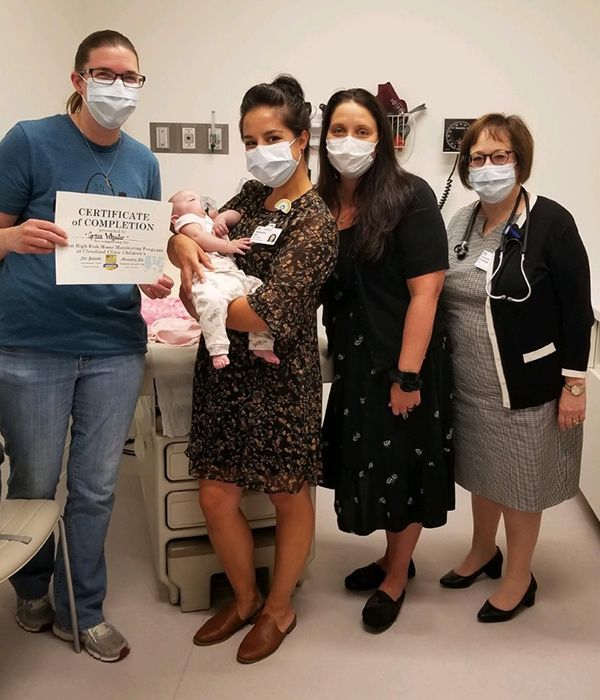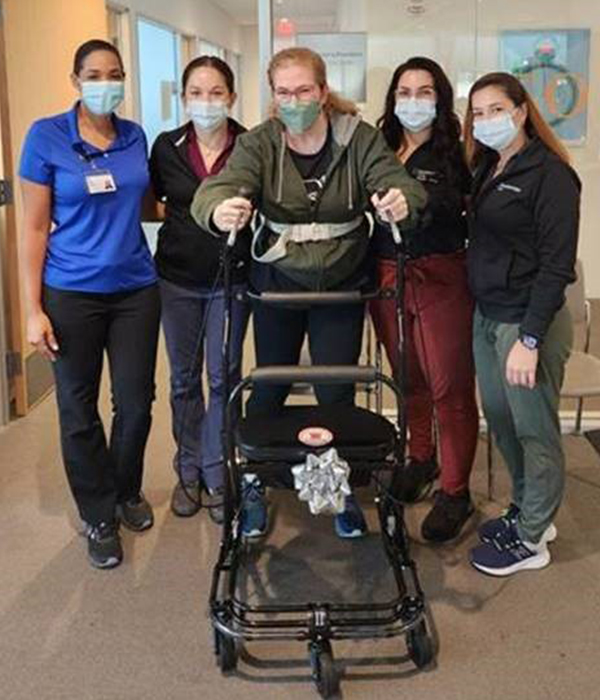Help Is Just a Heartbeat Away

As a Nurse Practitioner, Jodi Zalewski, MSN, CPNP-AC, RN, knows the best way for infants to thrive is at home with their parents and families. But for families of babies with congenital heart disease (CHD), sometimes it can be scary to be at home instead of the hospital.
These high-risk patients are enrolled in the Cleveland Clinic Children’s Infant High Risk Home Monitoring Program. The program requires parents to record their baby’s daily weight and daily pulse oximetry, monitor the amount of formula taken and send daily photos. Families are given “red flags” of when to call and be connected directly to their care team, made up of multiple team members from various disciplines. In addition, the care team and the family have a weekly phone call or virtual visit to discuss how the baby is doing at home.
“What's really nice about our program is the continuity of care,” says Jodi. “Prenatally, the families meet with someone on our team. After the birth, our team meets the family in the Cardiac ICU. Along with our care coordinator, Alexandria Gill, MSN, RN, we help transition our families through their medical journey. We see patients in the different ICU’s, floors, outpatient and at home. There is a real understanding of the patient and the family dynamics. We really become part of these patients’ families.”
Taking It Up a Notch
But Jodi thought more could be done to reassure families using advanced technology to increase the remote patient monitoring. She applied for and was awarded a Catalyst Grant in July 2022 to help fund her idea to expand the existing program.
The $100,000 grant funding covered the cost of three novel technologies that allow increased remote patient monitoring for high-risk infants with CHD:
- A custom home monitoring app accessed through the patient’s medical record tracks daily information and keeps data structured for viewing by parents and the care team. The app includes educational materials, red flag warning alarms, growth parameters, ways to track feeding schedules and diapers, all necessary phone numbers with direct links to the baby’s care team. Photos can be uploaded for the team to view and virtual visits are available if there are any concerns. If needed, 15 tablet computers are available for use at no cost to the family.
- A unique remote monitoring device increases two-way communication between parents and providers in real time through the app. This technology allows for a virtual clinic visit and physical exam, allowing the clinician to listen to heart and lung sounds and get a better picture of the baby’s clinical status.
- Pulse oximeters, heart rate monitors and scales that monitor infant vital signs.
The technology allows the clinical staff to connect with families in new ways and helps to equalize healthcare for families of all different backgrounds. For example, Jodi notes that some families may not have Wi-Fi at home. By sending them home with an iPad and the necessary apps, families can quickly access care, at any time and anywhere across the country. “We’re able to give them the tools that they need to care for their baby at home and still feel connected to their healthcare team,” she says.
Jodi is grateful for the opportunity to provide this level of care to her patients and thankful to the Catalyst Grant program and the donors who made it possible. “It just puts a smile on my face knowing that families are going to feel comfortable going home. We’re providing everything they need to not feel that stress or anxiety when they're at home. I've been in healthcare for over 15 years. The Catalyst Grant program has allowed me to really practice with the care and compassion that every patient deserves. We take care of the whole family.”
Donors are Helping to Prove New Ideas
Her final report is due in July 2023 and Jodi feels confident that the data and patient satisfaction surveys will show the technology is reassuring families that they have quick access to the medical team who is monitoring their child. “Our goal of using the app, virtual examination tools and vital sign monitoring is to improve quality of life for infants with CHD and their families, decrease family anxiety and prevent unnecessary readmissions and adverse events,” she says. “The program is also streamlining processes for our clinical care team, without whom this program wouldn’t be possible.”
Funded entirely through philanthropy, Catalyst Grants provide vital seed funding to try new ideas and prove new concepts and approaches. All contributions to the Catalyst Grants are combined and awarded to help advance caregivers' ideas. Twice a year, caregivers from all across Cleveland Clinic are invited to apply for Catalyst Grants. Through a competitive process, these one-time grants are awarded to the project proposals that show the most promise for making an impact within one year. Caregivers must report on their progress and return any unused funds.
100% of donations go directly toward Cleveland Clinic employees' brightest ideas and innovations—ideas like Jodi’s that are saving lives. Gifts are quickly put into action and support the entire cycle of ideas, from innovations to outcomes. The more money raised now, the more ideas that can become a reality. Learn more here.
Weston Hospital Catalyst Grant Idea Supports Neurological Care

Catalyst Grants have the potential to dramatically advance patient care … and it all starts with an idea.
At Cleveland Clinic Weston Hospital, the ingenuity of caregivers Karina Collazos, PTA; Shari Gordon, DPT; and Katerina Rooks, PTA, MS.Ed, was awarded in January 2023 with a Caregiver Catalyst Grant. It will allow the Physical Medicine & Rehabilitation Department to provide U-Step walkers to underserved patients diagnosed with neurological conditions.
The U-Step walker is a specialized assistive device that serves many patient populations, including Parkinson’s, stroke, ataxia, multiple sclerosis and more. The device has shown significant promise in decreasing risk of falls, improving gait mechanics and allowing patients to regain some functional independence after suffering from a neurological disorder. The U-Step walker can ultimately provide patients with hope and a better quality of life.
Bringing an Idea to Life
Caregivers Karina, Shari and Katerina were excited to present the first U-Step walker in February 2023, just one month after they were awarded the grant, to a grateful patient in need. Here’s what they had to say:
How will this Catalyst Grant impact the care you provide to patients?
The Catalyst Grant opportunity provides our team with the ability to provide U-Step walkers to underserved patients in our community. We work with many patients with various neurological deficits that show significant walking improvements when using this specific device that insurance does not typically cover. This is life-changing for the patient and their families—having the ability to help make a difference is remarkable.
What inspired your team to come up with the U-Step walker idea?
As a team, we started noticing improvements in patients that used the U-Step walker, however many patients couldn’t access this device due to a lack of insurance coverage. At times, this was frustrating for us because we felt that the patient’s progress was being affected. When the Catalyst Grant program became available, we thought it was an excellent opportunity for us to be able to provide walkers for patients who otherwise are unable to get it covered by insurance.
Since delivery of the first U-Step walker, the Physical Medicine & Rehabilitation Department has provided three additional U-Step walkers to patients, including one in Ohio. The U-Step walkers have provided more functional independence for these patients and has also increased their safety while walking. The Catalyst Grant will allow additional U-Step walkers to be purchased throughout the year to improve the lives of patients.
About the Catalyst Grants program
Launched in 2018, the Catalyst Grants program was created to help our caregivers launch their brightest ideas and positively impact our patients and communities.
Through a competitive process, these one-time grants are awarded to the project proposals that show the most promise for making a difference within one year. The number of grants awarded is limited only by the philanthropic support received from generous donors across the country.
The latest Catalyst Grants cycle in January 2023 awarded 31 grants to caregivers throughout Cleveland Clinic. These grants were made possible by the combined gifts of more than $1.4 million from thousands of generous donors.
How you can help
Your gift to Cleveland Clinic Florida will help transform healthcare for our patients, our communities and around the world. You can support the next round of innovative Catalyst Grant ideas by making a gift today.

